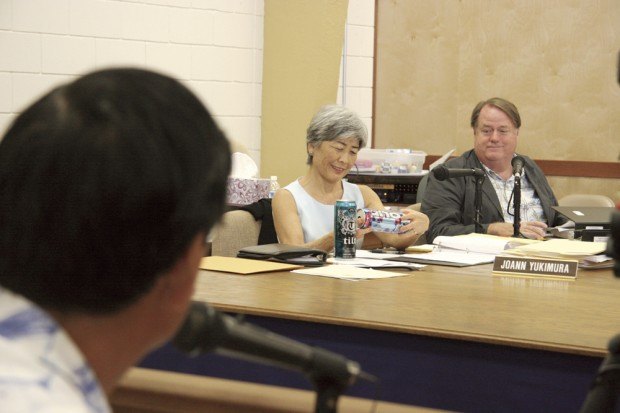NAWILIWILI — The head of the county’s Department of Liquor Control told Kaua‘i County Council members this week that the fight against underage drinking will get a boost next fiscal year, which starts July 1.
“As a result of being conscious to the budgetary constrains and our fiscal responsibilities … we are going to return back to what I refer to as our core function, which is enforcement and preventing underage drinking,” Director Eric Honma said Monday at his department’s budget review meeting before the council.
There are 205 liquor license holders on Kaua‘i. During FY10, which ended June 30, those licensees sold a combined $83 million in alcoholic beverages, according to Honma.
About 5 percent or more of those sales were for alcoholic beverages that ended up being consumed by minors, he said. This translates to underage residents consuming some $4 million of alcoholic beverages in FY10.
“It’s very easy and obvious to see how that sales number can translate to assaults, violence, accidents and those kinds of things,” Honma said.
The department’s proposed operational budget for FY12 is $1.15 million. Salaries of the eight budgeted positions amount to $438,730. The lowest paid position is investigator trainee, at $32,424. The highest paid investigator makes $60,744, but the highest paid position is Honma’s at $107,041.
Some licensees, he said, feel that it’s “very draconian” to send minors in sting operations.
“The licensee has every opportunity to succeed as opposed to fail,” said Honma, explaining that minor’s IDs are vertical and when asked they are not allowed to lie about their age. “There’s no entrapment history here, absolutely none.”
Honma said the department’s goals for FY12 are to reduce the availability of alcoholic beverages to minors and maintain an achieved rate of failure below 10 percent in compliance checks.
To reach those goals the department plans to conduct semi-annual compliance checks of all off-premise and on-premise licensees, provide on-site training and education for all licensees and ensure that at least one investigator is on duty daily.
During FY11, the department has conducted 34 off-premise compliance checks, resulting in two licensees selling alcohol to minor decoys, and 38 on-premise checks, resulting in 3 licensees selling alcohol to minor decoys.
Compliance checks showed a significant increase from previous years. In the last fiscal year, 21 out of 61 licensees failed on-premise checks. Prior to that, the last time the department conducted off-premise checks was FY09, when 11 out of 42 licensees failed inspection.
The fine for selling alcohol to minors is up to $2,000, but the department usually suspends $1,000. If the licensee re-offends within a year, he has to pay the suspended portion of the fine plus a new $2,000 fine.
“The fine becomes $3,000 at that point, and that has happened on a couple of occasions so far since we stepped up our compliance checks,” Honma said.
Some of the establishments “can well afford” the fine, Honma said, but to others it’s a “hefty fine” representing a week-and-a-half of receipts.
“If in fact we’re having this war on drugs and underage drinking I think the county has to put their money where their mouth is and say, ‘Hey, we’re not going to tolerate it,’” Councilman Mel Rapozo said.
The bottom line, he said, is that we all too often see the damages to our children.
Challenges and improvements
Honma said that during the furloughs in the first six months of the current fiscal year the department had challenges in maintaining adequate inspections and monitoring establishments.
Businesses, he said, are “really pushing the envelope” with creative promotions such as college nights, when inspectors need to be present.
“Noise enforcement is a continuous battle,” Honma said.
Maintaining investigators’ safety in the work environment also presents a challenge.
But what really caught the attention of council members were two colorful tall beverage cans with 12 percent of alcohol content each. Those cans, Honma said, are more appealing to the younger consumer because they’re cheaper and have juicy flavors.
Improvements in the department included greater information transparency and a better collaboration with the Anti-Drug Office initiatives against underage drinking, according to Honma.
Upcoming initiatives
Honma said the department plans to digitize all documents using a recently acquired high-speed machine that doubles as a scanner.
“We have folders that have Club Jetty information, Coco Palms, Waiohai Hotel, Po‘ipu Beach Hotel,” Honma said. “Some we need to keep for historical purposes, others because of legal requirements we have to maintain info for a certain amount of time.”
Honma said when all data is entered into the system investigators may be able to access information on-the-go through portable computers.
The department is working toward an idea of online payment of fees. Honma said the option is still being looked at because the department has only 205 licensees.
A underage-drinking database is being built, which would help many different agencies and organizations seek grants to curb underage drinking.
• Léo Azambuja, staff writer, can be reached at 245-3681 (ext. 252) or lazambuja@ thegardenisland.com.





